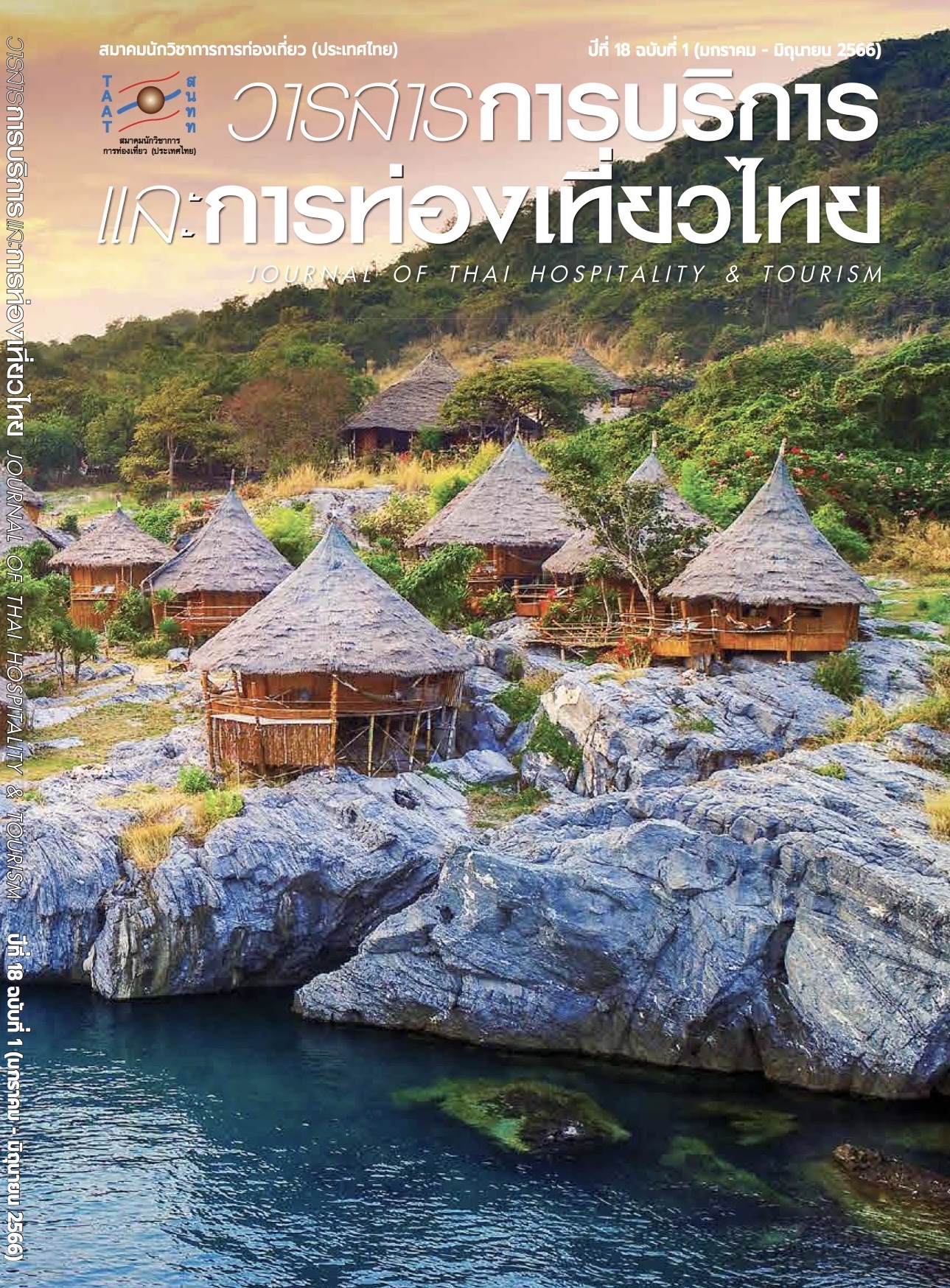แนวทางการพัฒนาการท่องเที่ยวเชิงอาหารเพื่อสุขภาพในกรุงเทพมหานคร
Main Article Content
บทคัดย่อ
การศึกษาในครั้งนี้ มีวัตถุประสงค์เพื่อศึกษาพฤติกรรมและความต้องการของนักท่องเที่ยวเชิงอาหารเพื่อสุขภาพในกรุงเทพมหานคร รวมถึงนำเสนอแนวทางในการพัฒนาและส่งเสริมให้กรุงเทพมหานครเป็นเมืองแห่งการท่องเที่ยวเชิงอาหารเพื่อสุขภาพเป็นงานวิจัยเชิงคุณภาพ โดยการสำรวจข้อมูลจากการสัมภาษณ์นักท่องเที่ยวจำนวน 30 คน และวิเคราะห์ข้อมูลโดยการวิเคราะห์เนื้อหา
ผลการศึกษาพบว่า ผู้ตอบแบบสัมภาษณ์ส่วนใหญ่มีความเห็นด้านพฤติกรรมและความต้องการไปในทางเดียวกันว่า 1) ให้ความสำคัญกับคุณภาพของวัตถุดิบหลักจากธรรมชาติและความปลอดภัยของอาหารเพื่อประโยชน์ต่อร่างกาย 2) การกำหนดราคาให้อยู่ในระดับที่มีความเหมาะสมโดยขึ้นอยู่กับคุณภาพของวัตถุดิบที่ใช้และปริมาณที่ได้รับ 3) สถานที่จำหน่ายสินค้าจะต้องมีความสะอาดถูกสุขลักษณะและมีความหลากหลาย 4) การจัดรายการส่งเสริมการขายที่น่าสนใจเหมือนกับขายสินค้าปกติทั่วไปและมีการโฆษณาประชาสัมพันธ์เกี่ยวกับคุณประโยชน์และรายละเอียดของสินค้าอย่างชัดเจน 5) บรรจุภัณฑ์ที่มีลักษณะสวยงาม ปลอดภัย พกพาสะดวกและมีการระบุรายละเอียดข้อมูลต่าง ๆ อย่างครบถ้วน 6) บุคลากรที่มีบุคลิกภาพที่ดีมีความรู้ความสามารถและมีใจรักการบริการ 7) มีกระบวนการควบคุมคุณภาพของสินค้าให้มีมาตรฐานและการสื่อสารคุณประโยชน์ของตัวสินค้าให้เข้าถึงกลุ่มลูกค้า ในส่วนของแนวทางในการพัฒนาศักยภาพการท่องเที่ยวเพื่อตอบสนองนักท่องเที่ยวเชิงอาหารเพื่อสุขภาพในกรุงเทพมหานครได้แก่ 1) การยกระดับภาพลักษณ์ด้วยการชูคุณภาพของวัตถุดิบจากธรรมชาติและความปลอดภัยต่อสุขภาพมาเป็นจุดขาย 2) การตั้งราคาสินค้าที่มีความหลากหลายและเหมาะสมเมื่อเปรียบเทียบกับคุณค่าและปริมาณที่ได้รับ 3) การพัฒนาช่องทางการขายให้มีความหลากหลาย ปลอดภัยและน่าเชื่อถือ 4) การสนับสนุนรายการส่งเสริมการขายที่ตรงกับความต้องการของนักท่องเที่ยว 5) การพัฒนาบรรจุภัณฑ์ให้มีความน่าสนใจสะดวกและปลอดภัย 6) การสื่อสารความเข้าใจและการควบคุมมาตรฐานของสินค้าอย่างชัดเจน 7) ฝึกอบรมทางด้านบุคลิกภาพและทักษะต่าง ๆ
Article Details

อนุญาตภายใต้เงื่อนไข Creative Commons Attribution-NonCommercial-NoDerivatives 4.0 International License.
เอกสารอ้างอิง
Ativetin, T. (2000). Consumer Culture and Health Food in an Urban Context. Chulalongkorn University Press.
Global Wellness Institute (GWI). (2013). Wellness Now A $3.72 Trillion Global Industry with 10.6% Growth from 2013–2015. https://www.globalwellnessinstitute.org/wellness-now-a-372-trillion-global-industry
Kalaya, P. (2021). Gastronomy Tourism Management as a Participatory Community Development Innovation and Approaches. Journal of Cultural Approach, 22(41), 81–95.
Khunakornbodin, S., Moakkul, M., Sapha, W. & Seeprasert, S. (2006). Potentialities for Tourism Planning and Management : A Case Study of Lanna Food Restaurants in Chiang Rai Province. Thailand Science Research and Innovation.
Ministry of Tourism and Sports (MOTS). (2019). Tourism Statistics 2019. https://www.mots.go.th/more_news_new.php?cid=618
Naksawat, N. & Dhamabutra, P. (2020). Approaches for Sustainable Integrated Creative Southern Food Tourism Development in Surat Thani Province, Thailand. Journal of Cultural Approach, 21(39), 58–69.
National Geographic. (2019). Gastronomy. Retrieved from https://ngthai.com/news-activity/20864/gastronomy/
Nuntasin, N. (2015). Factors Affecting Consumer’s Consumption Behavior and Loyalty toward Health Food in Bangkok Metropolis. Journal of Cultural Approach, 16(29), 3–18.
Preedapatharapong, N. (2015). Consumption of Health Buddhist Foods. Journal of Graduate Studies Review, 15(3), 42–51.
Promchan, A. (2018). Meanings of Healthy Food and Frozen Food Consumtion in Chiang Mai. Presented in the Graduate School Conference 2018, Suan Sunandha Rajabhat University.
Pullphothong, L. & Sopha, C. (2012). Gastronomic Tourism in Ayuttaya, Thailand. http://www.ijbts-journal.com/images/main_1366796758/0043-Ladapha.pdf
UBM Asia. (2018). Health Trends. https://www.bltbangkok.com/bangkok-update/4405/
Wiyaporn, W. (2020). Guildlines for Development Pattaya to Sustainable Shopping Tourism City of Mainland Chinese Tourists. Rajabhat Chiang Mai Research Journal, 21(3), 228–249.
World Tourism Organization (UNWTO). (2019). International Torism Highlights. https://www.e-unwto.org/doi/pdf/10.18111/9789284421152
Yeoman, I. (2008).Why Food Tourism is Becoming More Important?. https://www.hospitalitynet.org/opinion/4037197.html


